
Sir Fred Hoyle FRS (24 June 1915 – 20 August 2001) was an English astronomer who formulated the theory of stellar nucleosynthesis and was one of the authors of the influential B2FH paper. He also held controversial stances on other scientific matters—in particular his rejection of the "Big Bang" theory (a term coined by him on BBC Radio) in favor of the "steady-state model", and his promotion of panspermia as the origin of life on Earth. He spent most of his working life at the Institute of Astronomy at Cambridge and served as its director for six years.

Antony Hewish was a British radio astronomer who won the Nobel Prize for Physics in 1974 for his role in the discovery of pulsars. He was also awarded the Eddington Medal of the Royal Astronomical Society in 1969.
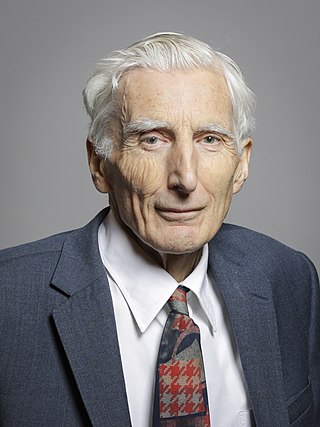
Martin John Rees, Baron Rees of Ludlow, is a British cosmologist and astrophysicist. He is the fifteenth Astronomer Royal, appointed in 1995, and was Master of Trinity College, Cambridge, from 2004 to 2012 and President of the Royal Society between 2005 and 2010.

John David Barrow was an English cosmologist, theoretical physicist, and mathematician. He served as Gresham Professor of Geometry at Gresham College from 2008 to 2011. Barrow was also a writer of popular science and an amateur playwright.

Geoffrey Ronald Burbidge (24 September 1925 – 26 January 2010) was an English astronomy professor and theoretical astrophysicist, most recently at the University of California, San Diego. He was married to astrophysicist Margaret Burbidge and was the second author of the influential B2FH paper which she led.

Donald Lynden-Bell CBE FRS was a British theoretical astrophysicist. He was the first to determine that galaxies contain supermassive black holes at their centres, and that such black holes power quasars. Lynden-Bell was President of the Royal Astronomical Society (1985–1987) and received numerous awards for his work, including the inaugural Kavli Prize for Astrophysics. He worked at the University of Cambridge for his entire career, where he was the first director of its Institute of Astronomy.
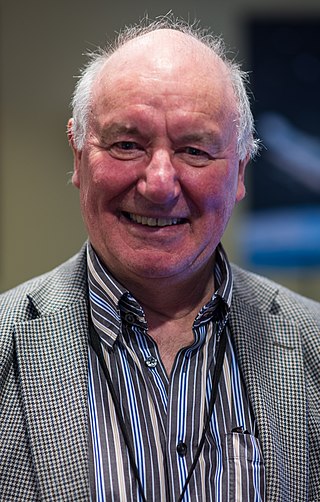
Malcolm Sim Longair is a British physicist. From 1991 to 2008 he was the Jacksonian Professor of Natural Philosophy in the Cavendish Laboratory at the University of Cambridge. Since 2016 he has been Editor-in-Chief of the Biographical Memoirs of Fellows of the Royal Society.

Dennis William Siahou Sciama, was an English physicist who, through his own work and that of his students, played a major role in developing British physics after the Second World War. He was the PhD supervisor to many famous physicists and astrophysicists, including John D. Barrow, David Deutsch, George F. R. Ellis, Stephen Hawking, Adrian Melott and Martin Rees, among others; he is considered one of the fathers of modern cosmology.
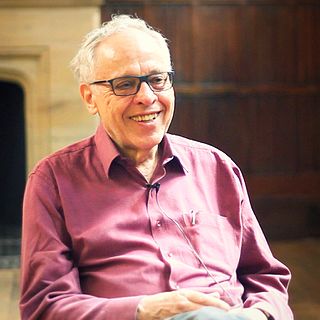
Joseph Ivor Silk FRS is a British-American astrophysicist. He was the Savilian Chair of Astronomy at the University of Oxford from 1999 to September 2011.

Carlos Silvestre Frenk is a Mexican-British cosmologist. Frenk graduated from the National Autonomous University of Mexico and the University of Cambridge, and spent his early research career in the United States, before settling permanently in the United Kingdom. He joined the Durham University Department of Physics in 1986 and since 2001 has served as the Ogden Professor of Fundamental Physics at Durham University.
Andrew Christopher Fabian is a British astronomer and astrophysicist. He was Director of the Institute of Astronomy, University of Cambridge from 2013 to 2018. He was a Royal Society Research Professor at the Institute of Astronomy, Cambridge from 1982 to 2013, and Vice-Master of Darwin College, Cambridge from 1997 to 2012. He served as president of the Royal Astronomical Society from May 2008 through to 2010.
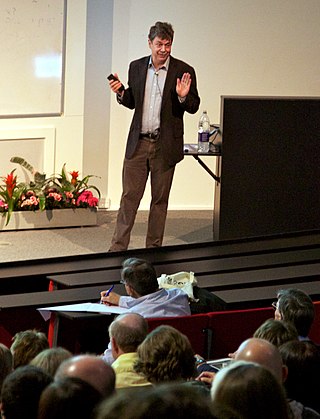
Simon David Manton White, FRS, is a British astrophysicist. He was one of directors at the Max Planck Institute for Astrophysics before his retirement in late 2019.
Christopher David Impey is a British astronomer, educator, and author. He has been a faculty member at the University of Arizona since 1986. Impey has done research on observational cosmology, in particular low surface brightness galaxies, the intergalactic medium, and surveys of active galaxies and quasars. As an educator, he has pioneered the use of instructional technology for teaching science to undergraduate non-science majors. He has written many technical articles and a series of popular science books including The Living Cosmos, How It Began, How It Ends: From You to the Universe, Dreams of Other Worlds, and Humble Before the Void. He served as Vice-President of the American Astronomical Society, he is a Fellow of the American Association for the Advancement of Science, and a Howard Hughes Medical Institute Professor. He serves on the Advisory Council of METI.
Shashikumar Madhusudan Chitre FNA, FASc, FNASc, FRAS was an Indian mathematician and astrophysicist, known for his research in Astronomy and Astrophysics. The Government of India honored him, in 2012, with Padma Bhushan, the third highest civilian award, for his services to the sciences.
Ramanath Cowsik is an Indian astrophysicist and the James S. McDonnell Professor of Space Sciences at Washington University in St. Louis. He is considered by many as the father of astroparticle physics. A recipient of the Shanti Swarup Bhatnagar Prize, Cowsik was honored by the Government of India, in 2002, with the fourth highest Indian civilian award of Padma Shri

Stephen John Warren is a Professor of astronomy at Imperial College London.
Rachel Lindsey Webster, is an Australian astrophysicist who became the second female professor of physics in Australia. Her main focus areas are extragalactic astronomy and cosmology; she researches black holes and the first stars of the universe. Webster has a doctoral degree from Cambridge University and has held postdoctoral positions at the University of Toronto and University of Melbourne.
Richard John Davis, OBE, FRAS was a radio astronomer for the Jodrell Bank Centre for Astrophysics at the University of Manchester.
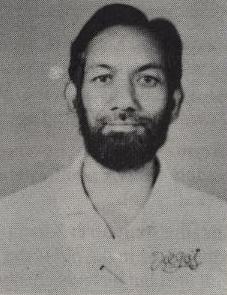
Vijay Kumar Kapahi was an Indian astrophysicist and the director of the National Centre for Radio Astrophysics, an autonomous division of Tata Institute of Fundamental Research. Known for his research on radio galaxies, quasars and observational cosmology, Kapahi was an elected fellow of all the three major Indian science academies – Indian Academy of Sciences, Indian National Science Academy and National Academy of Sciences, India – as well as of the Maharashtra Academy of Sciences. The Council of Scientific and Industrial Research, the apex agency of the Government of India for scientific research, awarded him the Shanti Swarup Bhatnagar Prize for Science and Technology for his contributions to physical sciences in 1987.
Gopal Krishna is an Indian radio astronomer and a senior professor at the National Centre for Radio Astrophysics. Known for his studies on Radio galaxies and quasars, Krishna is an elected fellow of all the three major Indian science academies viz. Indian Academy of Sciences, National Academy of Sciences, India and Indian National Science Academy. The Council of Scientific and Industrial Research, the apex agency of the Government of India for scientific research, awarded him the Shanti Swarup Bhatnagar Prize for Science and Technology, one of the highest Indian science awards, for his contributions to physical sciences in 1993.












